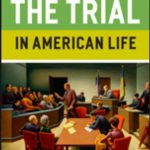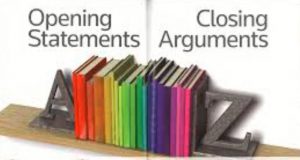TRIAL in GENERAL Terms
The Sections of Article 40.:
- NY CPLR § 4001. Powers of referees
- NY CPLR Rule Rule 4011. Sequence of trial
- NY CPLR Rule Rule 4012. Marked pleadings furnished
- NY CPLR Rule Rule 4013. Trial elsewhere than at courthouse
- NY CPLR Rule Rule 4014. Duration of trial
- NY CPLR Rule Rule 4015. Time for motion for referee or advisory jury
- NY CPLR Rule Rule 4016. Opening and closing statements
- NY CPLR § 4017. Objections
- NY CPLR Rule Rule 4018. Increased damages
- NY CPLR Rule Rule 4019. Recording in camera interviews of infants
NY CPLR § 4001. POWERS OF REFEREES
A court may appoint a referee to determine an issue, perform an act, or inquire and report in any case where this power was heretofore exercised and as may be hereafter authorized by law.
NY CPLR RULE RULE 4011. SEQUENCE OF TRIAL
The court may determine the sequence in which the issues shall be tried and otherwise regulate the conduct of the trial in order to achieve a speedy and unprejudiced disposition of the matters at issue in a setting of proper decorum.
NY CPLR RULE RULE 4012. MARKED PLEADINGS FURNISHED
The party who has filed the note of issue shall furnish the judge who is to preside at the trial with copies of each pleading, where they have not been superseded by the pre-trial order, plainly marked to indicate which statements are admitted and which controverted by the responsive pleading.
NY CPLR RULE RULE 4013. TRIAL ELSEWHERE THAN AT COURTHOUSE
Upon stipulation of the parties, the judge who is to preside at the trial of an issue may direct trial in whole or in part at a specified place other than the courthouse.
NY CPLR RULE RULE 4014. DURATION OF TRIAL
Notwithstanding the expiration of the term at which it was commenced, a trial shall continue until it is completed.
NY CPLR RULE RULE 4015. TIME FOR MOTION FOR REFEREE OR ADVISORY JURY
A motion for trial by a referee or an advisory jury shall be made within twenty days after note of issue is filed, except where the issue to be tried arises on a motion or pursuant to a judgment.
NY CPLR RULE RULE 4016. OPENING AND CLOSING STATEMENTS
(a) Before any evidence is offered, an attorney for each plaintiff having a separate right, and an attorney for each defendant having a separate right, may make an opening statement. At the close of all the evidence on the issues tried, an attorney for each such party may make a closing statement in inverse order to opening statements.
(b) In any action to recover damages for personal injuries or wrongful death, the attorney for a party shall be permitted to make reference, during closing statement, to a specific dollar amount that the attorney believes to be appropriate compensation for any element of damage that is sought to be recovered in the action. In the event that an attorney makes such a reference in an action being tried by a jury, the court shall, upon the request of any party, during the court’s instructions to the jury at the conclusion of all closing statements, instruct the jury that:
- the attorney’s reference to such specific dollar amount is permitted as argument;
- the attorney’s reference to a specific dollar amount is not evidence and should not be considered by the jury as evidence; and
- the determination of damages is solely for the jury to decide.
NY CPLR § 4017. OBJECTIONS
Formal exceptions to rulings of the court are unnecessary. At the time a ruling or order of the court is requested or made a party shall make known the action which he requests the court to take or, if he has not already indicated it, his objection to the action of the court. Failure to so make known objections, as prescribed in this section or in section 4110-b may restrict review upon appeal in accordance with paragraphs three and four of subdivision (a) of section 5501.
NY CPLR RULE RULE 4018. INCREASED DAMAGES
Where increased damages are granted by statute, the decision, report or verdict shall specify the sum awarded as single damages, and judgment shall be entered for the increased amount.
NY CPLR RULE RULE 4019. RECORDING IN CAMERA INTERVIEWS OF INFANTS
(a) A court shall not conduct an in camera interview of an infant in any action or proceeding to fix temporary or permanent custody or to modify judgments and orders of custody concerning marital separation, divorce, annulment of marriage and dissolution of marriage unless a stenographic record of such interview is made.
(b) If an appeal is taken to the appellate division from a judgment or order of the court on any such action or proceeding, the stenographic record of any such interview shall be made a part of the record and forwarded under seal to the appellate division.
Updated: April 6, 2019


